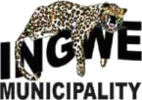Ingwe Local Municipality was an administrative area in the Harry Gwala District of KwaZulu-Natal in South Africa. Ingwe is an isiZulu name word that means leopard. The municipality was given the name because there were leopards in this area many years ago.[3]
Ingwe | |
|---|---|
 Location in KwaZulu-Natal | |
| Country | South Africa |
| Province | KwaZulu-Natal |
| District | Harry Gwala |
| Seat | Creighton |
| Wards | 11 |
| Government | |
| • Type | Municipal council |
| • Mayor | Nomangungu Luzulane |
| Area | |
• Total | 1,976 km2 (763 sq mi) |
| Population (2011)[2] | |
• Total | 100,548 |
| • Density | 51/km2 (130/sq mi) |
| Racial makeup (2011) | |
| • Black African | 98.7% |
| • Coloured | 0.2% |
| • Indian/Asian | 0.1% |
| • White | 0.8% |
| First languages (2011) | |
| • Zulu | 94.7% |
| • English | 1.6% |
| • Southern Ndebele | 1.2% |
| • Other | 2.5% |
| Time zone | UTC+2 (SAST) |
| Municipal code | KZN431 |
The area of the former Ingwe municipality is exceptionally poor and underdeveloped, relying heavily on agriculture as the main source of livelihood. The lack of a major trading centre such as the neighbouring towns of Underberg and Ixopo has limited the economic growth opportunities for this municipality.[4]
After the municipal elections on 3 August 2016 it was merged with Kwa Sani Local Municipality into the new Dr Nkosazana Dlamini Zuma Local Municipality.
Main places
editThe 2001 census divided the municipality into the following main places:[5]
| Place | Code | Area (km2) | Population |
|---|---|---|---|
| Amacala Gwala | 54701 | 20.29 | 5,387 |
| Amangwane | 54702 | 29.09 | 1,095 |
| Bhidla | 54703 | 283.82 | 35,404 |
| Bulwer | 54704 | 4.03 | 731 |
| Creighton | 54705 | 3.49 | 456 |
| Donnybrook | 54706 | 0.92 | 218 |
| Esibonelo Esihle | 54707 | 81.96 | 7,000 |
| Impendle | 54708 | 211.66 | 920 |
| Ixopo | 54710 | 16.75 | 2,982 |
| Madzikone | 54711 | 59.00 | 10,602 |
| Memela | 54712 | 87.40 | 19,319 |
| Ncwadi | 54713 | 35.43 | 3,974 |
| Nxamalala | 54714 | 3.67 | 0 |
| Sandanezwe | 54715 | 42.72 | 4,827 |
| Tarsvaly | 54716 | 2.03 | 990 |
| Zashuke | 54717 | 79.29 | 6,827 |
| Remainder of the municipality | 54709 | 1,008.65 | 6,819 |
Politics
editThe municipal council consisted of twenty-two members elected by mixed-member proportional representation. Eleven councillors were elected by first-past-the-post voting in eleven wards, while the remaining eleven were chosen from party lists so that the total number of party representatives was proportional to the number of votes received. In the election of 18 May 2011 the African National Congress (ANC) won a majority of sixteen seats on the council. The following table shows the results of the election.[6][7]
| Party | Votes | Seats | ||||||
|---|---|---|---|---|---|---|---|---|
| Ward | List | Total | % | Ward | List | Total | ||
| ANC | 19,846 | 20,588 | 40,434 | 72.9 | 11 | 5 | 16 | |
| IFP | 3,183 | 3,140 | 6,323 | 11.4 | 0 | 3 | 3 | |
| NFP | 2,869 | 3,038 | 5,907 | 10.7 | 0 | 2 | 2 | |
| DA | 517 | 776 | 1,293 | 2.3 | 0 | 1 | 1 | |
| Independent | 916 | – | 916 | 1.7 | 0 | – | 0 | |
| ACDP | 329 | 250 | 579 | 1.0 | 0 | 0 | 0 | |
| Total | 27,660 | 27,792 | 55,452 | 100.0 | 11 | 11 | 22 | |
| Spoilt votes | 726 | 673 | 1,399 | |||||
References
edit- ^ "Contact list: Executive Mayors". Government Communication & Information System. Archived from the original on 14 July 2010. Retrieved 22 February 2012.
- ^ a b c "Statistics by place". Statistics South Africa. Retrieved 27 September 2015.
- ^ South African Languages - Place names
- ^ KwaZulu-Natal Top Business - Ingwe Municipality[permanent dead link]
- ^ Lookup Tables - Statistics South Africa[permanent dead link]
- ^ "Results Summary – All Ballots: Ingwe" (PDF). Independent Electoral Commission. Retrieved 3 December 2013.
- ^ "Seat Calculation Detail: Ingwe" (PDF). Independent Electoral Commission. Retrieved 3 December 2013.
